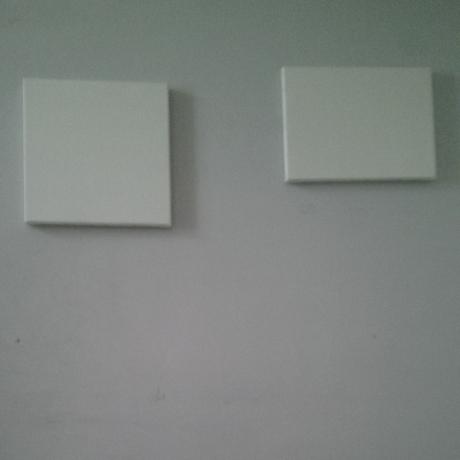
‘Nothingness,’ writes Sartre (1998 [1943]: 21) ominously, ‘lies coiled in the heart of being–like a worm.’ His pessimism is pervasive, but mundane. His obsession with nothingness brings us from the edge of the howling abyss to the yawning emptiness of our wallets, but the view from precipice–or that from the lively but friendless café–permits him to trace deep undercurrents through the nature of our being (1998: 6; 9-10; 30). The holes–the gaps–the refusals–the unremarked slipping by of opportunities–can certainly cause us to well up with existential dread. But they also reveal the immense power we can have over our lives, and the immense responsibility we have for the way we live them. For Sartre, this responsibility is a radical freedom so intoxicating and so burdensome it can make us sick; it is also inextricably bound up with even the tiniest eruptions of nothingness that surface in the world.
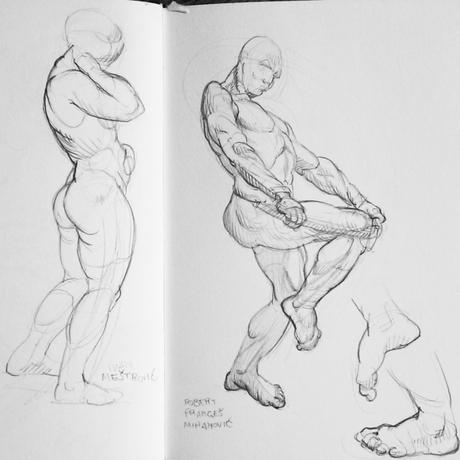
Copies after Meštrovic and Mihanovic
For we are the originators of nothingness, Sartre (1998: 8; 24) argues; every nothingness lives in our own minds as a sheer fabrication, a mere interpretation of events. Destruction is but a perspective: a city is only destroyed if we view it as such; in purely physical terms its components are merely rearranged. ‘There is no less after the storm than before. There is something else’ (Sartre, 1998: 8). The world surges on like a ruthless, rolling ocean, re-adjusting its parts without regard for the petty values we place on certain arrangements. The very concept of negation comes from the thwarted sense of importance we have arbitrarily placed on something.
Perhaps he first glimpsed this thread in Husserl. In posing a question, says Sartre (1998: 4-5; 23), we thrust a negative element into the world. Inserting nothingness into the world, we make ‘the world iridescent, casting a shimmer over things’ (Sartre, 1998: 23). When we ask, we admit space for the answer to be ‘no.’ As Husserl (1973 [1948]) puts it, we invite doubt into the world, we acknowledge that things are not unfolding mechanistically, we entertain other futures. Doubt is thus the flip side of possibility. For something to be possible–not definite–it must be able to waver. It could come off or it might not. Doubt, which seems to undermine our plans and our sense of self, in fact gives the world its luxurious openness. Uncertainty looms ahead of us like a door left ajar, it gives us a foothold, it show the world to be full of cracks into which we can force ourselves and impose our will, through which we can inflict change on the world, redirect its course.
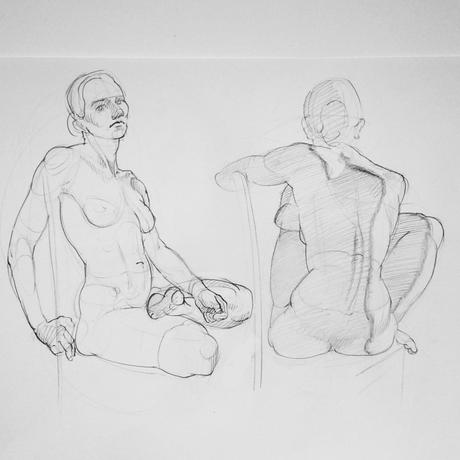
And so Husserl (1972: 87) sees the world as a kaleidoscopic churning of possibilities, of open questions, of expectations, trembling at its edges. As we stalk those edges with trepidation, they shift and reorient themselves according to our every move. The structure of the world, asserts Husserl (1972: 82-83; 1999 [1950]: 45), against the scientific spirit, is horizonal; its horizons are ever just at the edge of our sight, but ever rolling away from it. The view is different from wherever we stand: but from whichever position it remains petulantly ambiguous (Merleau-Ponty, 2012: 79, 80; 196).
We only discover this structure, says Heidegger (1993 [1927]: 74-75), when things break down. When our equipment falters and shocks us out of our practical unity with them, when our reflective, thinking attention is drawn to their heavy uselessness and suddenly obvious separateness from our own bodies. Or when we discover them not there–the unfortunate lightness of our wallets–we are cast into the solemn and terrible mood that is Angst. The small non-beings bring us face to face with the great nothingness, face to face with ourselves. Where we are ordinarily lost in our doings and projects, merged with the world in practical little acts, our sudden reflective detachment from the world presents us with the unimportance of our little schemes and ushers in a sickening sense of futility. Stripped of its practical significance, the world is bare before us, devoid of meaning, robbed of value (Heidegger, 1993: 185-187).
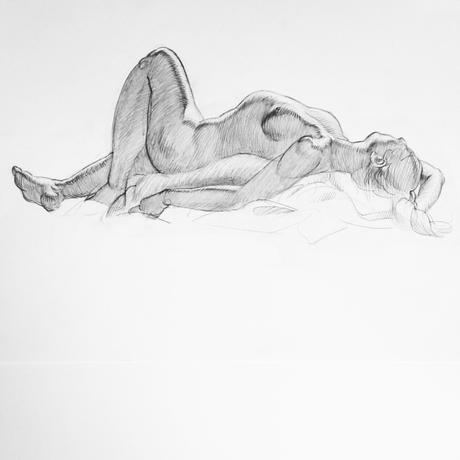
But it is Sartre who remains gravely optimistic. This Angst is too all-encompassing; it makes the world too precarious, a world which in any case has no meaning. Negation greets us in some form at every turn, and it is not so earth-shattering as Heidegger would have it. The small nothingnesses whisper to us sweetly in their languid triviality, but even in their banality they can give us sharp moments of insight to our own freedom.
These insights cause us anguish, but it is anguish that urges us from the wavering edge of indecision. Anguish is an agony that eats us from the inside. Fear stalks us from outside, when we feel ourselves threatened or cornered, at the mercy of fate. Fear swells in us at the edge of the cliff, as we eye the loose gravel and step timidly on the uneven ground. But fear becomes anguish when the sinister thought enters our mind that we could cast ourselves over the edge (Sartre, 1998: 29). That the car keeps to its steady course on the endless highway because of the gentle guidance of our calm hands, but that a violent, decisive movement would wrench us into the oncoming truck. In that moment, we see that all our impulses are alike, that all are equally in our hands, that we are not cast about at the whim of chance but are shaping our future with every act. That every time we fail to choose (another tiny negation), every time we quietly watch an opportunity politely fade away, we have made as firm a choice as had we grasped it.
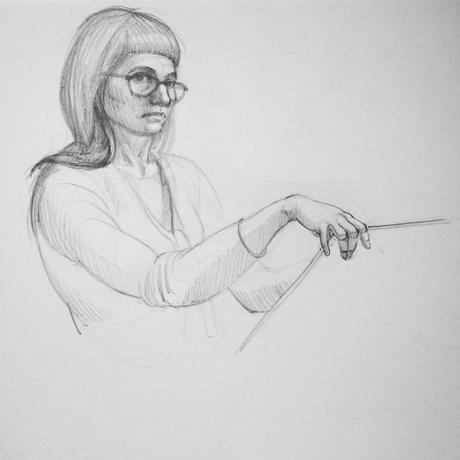
Even these small, offhand acts, lighting a cigarette, raising a coffee to our lips, are the very things that inject value into the world, insists Sartre (1992: 36-38). In taking up this pen, this brush, I affirm that writing, painting, matter to me, ‘without justification and without excuse’ (Sartre, 1992: 39). In painting this picture I affirm myself, I force myself onto the world as a painter, I construct my identity, I project my future, I declare that ‘I am the self which I will be, in the mode of not being it’ (Sartre, 1998: 32). I make small steps toward that future, laying little seeds of meaning in the world like a trail of shiny coins. I solemnly make appointments with myself in the future, with anguish lurking at my back, agonising at the thought that I might not meet myself there (Sartre, 1998: 36).
Sartre digs up nothingness where others would rather not, but it is because he has seen that possibility implies negation. And where there is possibility one can exert one’s freedom. We must choose at every juncture, continually remake ourselves, examine ourselves at every step, question ourselves, even doubt ourselves (Sartre, 1998: 35). That we might fail is the very condition of possibility: that something is at stake affirms that something matters to us, that we have imposed a pocket of meaning in the world. With anguish hounding us we must seize the burden of responsibility. ‘Only those who can truly give themselves a burden are free.’ (Heidegger, 1995 [1983]: §38).
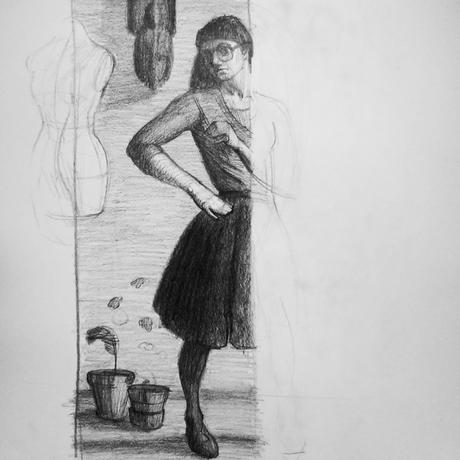
Heidegger, Martin. 1995 [1983]. The Fundamental Concepts of Metaphysics: World, Finitude, Solitude. Trans. William McNeill and Nicholas Walker. Bloomington: Indiana University.
Heidegger, Martin. 1993 [1927]. Sein und Zeit. 19. edition. Tübingen: Max Niemeyer.
Husserl, Edmund. 1999 [1950]. Cartesian Meditations: An Introduction to Phenomenology. Trans. Dorion Cairns. Dordrecht: Kluwer.
Husserl, Edmund. 1973 [1948]. Experience and Judgment: Investigations in a Genealogy of Logic. London: Routledge & Kegan Paul.
Husserl, Edmund. 1970 [1954]. The Crisis of European Sciences and Transcendental Phenomenology: An Introduction to Phenomenological Philosophy. Trans: David Carr. Evanston: Northwestern University.
Merleau-Ponty, Maurice. 2012 [1945]. Phenomenology of Perception. Hoboken: Routledge.
Sartre, Jean-Paul. 1998 [1943]. Being and Nothingness: An Essay on Phenomenological Ontology. Trans. Hazel E. Barnes. London: Routledge.
